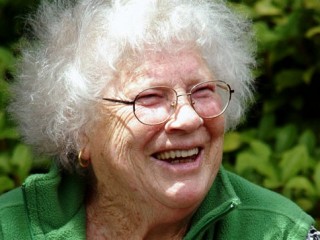
Janet Frame biography
Date of birth : 1924-08-28
Date of death : 2004-01-29
Birthplace : Dunedin, New Zealand
Nationality : New Zealand
Category : Arts and Entertainment
Last modified : 2011-09-28
Credited as : author, novelist, short stories writer
1 votes so far
Born in 1924, Frame grew up in an impoverished household. Her father was an engineer for the railroad, and her mother had once been a maid in the household of Katherine Mansfield, one of New Zealand's most famous authors. Frame likely inherited her literary ambitions from her mother, who wrote poetry and peddled it door-to-door in their neighborhood. But it was a bleak life, and the situation was compounded by the drowning deaths of two of Frame's sisters. She emerged from adolescence a painfully shy, socially awkward young woman, but found regular refuge in her writing. Schooled at a teachers' college in Dunedin, she was expected to undergo an evaluation for her student teaching credit, but when the observer arrived to watch her in the classroom, she panicked and fled. A suicide attempt followed, but she later enrolled at the University of Otaga. There, for a psychology-class assignment, she wrote about the attempt, and school authorities became alarmed. She was forced into treatment two days later, and spent the next eight years confined to a psychiatric hospital.
Frame was diagnosed with schizophrenia, and underwent extensive electroshock treatment. A leucotomy was recommended, a surgery that would sever the connection between the brain and its prefrontal cortex. Such procedures were performed regularly between the 1930s through the '60s as a treatment for severe depression or anxiety, but sometimes rendered the patient into a near-catatonic state. A doctor at the hospital, however, saw that a collection of short stories by Frame, The Lagoon, had been published and even won a literary prize. She was released from care, and taken in by a well-known New Zealand writer, Frank Sargeson. He let her stay in an old Army hut on his property outside Auckland, where she wrote her first novel, 1957's Owls Do Cry, based on her own experiences as a shy child and a young woman undergoing psychiatric treatment.
Frame received a government grant, and used it to travel to Spain and England. She produced a number of novels in the early part of the 1960s, including Faces in the Water, about a woman in a psychiatric hospital. Often her fictional characters were silenced in some way, either mute or shunned by others. Of her 12 novels, "each explored a dimension of human suffering and rejection and furthered her reputation for graceful and sorrowful prose," noted Adam Bernstein in the Washington Post. "Frame's literary output often blended themes of fractured identity, morbidity, and caustic appraisals of modern society."
Frame was fascinated by language and its possibilities, and once recounted the genesis of one of her novels. She had gone to see a London dentist, who "was very vague," she remembered, according to her obituary in the London Independent newspaper by C.K. Stead. "Then he said, 'Rinse whilst I'm gone.' I hadn't heard anyone say 'whilst' and it was that word that prompted me to write the whole book."
During her time in London, she was also examined at a renowned mental-health facility, whose doctors concluded she had never suffered from schizophrenia in the first place. Her later autobiographies-beginning with To the Is-land in 1982 and concluding in 1985 with The Envoy from Mirror City -strive to explain how she came to be misdiagnosed. The middle volume, An Angel at My Table, was made into an acclaimed 1990 film by Jane Campion. "It's no wonder that I value writing as a way of life when it actually saved my life," she later wrote in one of her autobiographies, according to Los Angeles Times obituary writer Mary Rourke.
Frame was less shy later in life, but remained somewhat reclusive. In 1990, she received her country's highest honor, the Order of New Zealand. Frame died at the age of 79 in Dunedin on January 29, 2004; she had been suffering from leukemia. The woman "widely considered New Zealand's finest writer," according to Rourke, was the subject of a 2001 biography, Wrestling with the Angel. She had told its author, Michael King, that sometimes others suggested to her, "'Why don't you go out and mix?'" referring to her preference for isolation, and scoffed, "as if I were a pudding."
















